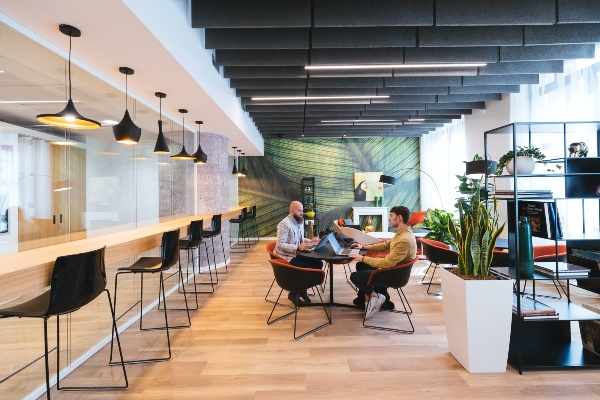The events of 2020 brought about an onslaught of changes in almost every aspect of our lives. Faced with a global pandemic, travel was halted, social interactions were hugely limited, and the majority of workplaces had to send their employees home to try and do their jobs in a totally different environment than usual.
A lot has changed over the past 3 years, with one of the biggest differences being our attitude towards remote working. Whilst many people were apprehensive about being forced to work from their homes for months on end, many of them were won over by the experience after a while. Even after the risk of infection dropped enough to allow employees back into their workplaces, plenty of them decided that they’d rather continue working from home.
Recent research by the Office for National Statistics found that 84% of workers that had worked from home because of the pandemic planned to continue doing so, with 42% opting for a hybrid pattern of mainly working remotely and sometimes going into the office. Many employers have offered their staff the chance to return to work in person, but a lot of people that have the option to work from home prefer the benefits of working remotely, choosing only to travel to work when absolutely necessary.
A 2022 study from FlexJobs found that 77% of workers feel that the option to work remotely is the second most important benefit they consider in a new job, with 57% of respondents saying that they would leave a job if their employer wouldn’t let them work remotely. So not only do a lot of people prefer working remotely, many of them would prioritise it when looking for career opportunities.
The engineering industry was a sector that took a while to properly adapt to remote working, as plenty of jobs involved working with particular machines or tools that were only available on-site. Engineering teams also struggled to establish the best way to work collaboratively when members were scattered across different locations, utilising new digital tools and having to develop new processes that allowed for less organic communication.
However, these initial teething problems didn’t present a challenge for long, and now many businesses in the electronics and embedded systems engineering industry have successfully adapted to having a lot of their staff working remotely. This has brought with it a range of benefits, with a key gain for businesses being the ability to hire talented and specialised candidates from a range of locations, not just those based nearby.
Remote and flexible working has also led to a rise in engineering candidates swapping full-time work for contract work and consultancy, which provides businesses with more flexible options when growing their teams and embarking on projects that require specific experience or insight.
It’s safe to say that work from home trends have permanently altered the way that many of us view work, and the recruitment industry in particular has been impacted by this change in what candidates expect from potential employers and the way that remote working can massively widen a talent pool. Employers must stay in touch with what candidates want and how external events may impact attitudes towards remote working, remaining competitive by offering the best options in line with the future of working from home.

The Challenges of Working Remotely From Home in 2023
All of these points make it seem as though remote working is something that is definitely here to stay, and it’s true that a large percentage of workers have said that they want to continue working either entirely from home or in a hybrid style. But looking ahead to 2023, several factors need to be considered before predicting just how many employees will want to remain remote.
Firstly, whilst a lot of businesses have taken remote and hybrid working in their stride, some are coming down hard on employees that wish to work from home all the time. Some employers are making it mandatory for employees to come into the office for a minimum number of days a week, deciding that in-person work is the best route towards success.
Employees facing this challenge are left with two options; return to working in the office or find a new job that allows them to continue with remote working. In many cases, neither of these options will be preferable, and if you’re an employer insisting that your staff return to the office full-time or part-time, it’s worth considering what you’re actually seeking to gain from this and how employee morale may be affected.
Another significant challenge that has already started to impact the future of working from home after COVID is the cost of living crisis that the UK is currently facing. The winter of 2022 is predicted to be particularly challenging for many households as they struggle to cope with the rising costs of everything from utility bills to groceries, and those that were initially happy working from home may now find themselves preferring a different option.
One of the key reasons for this is that working from home requires more electricity and heating during the day than if you are only in the house in the morning and evening, which many people may now struggle to afford. The UK’s cold weather means that the prospect of sitting in a freezing house will be way less appealing to previous home workers, with the option to go and work in an office where heating and electricity are provided becoming more popular.
House prices in the UK have also skyrocketed, which has impacted many people’s living situations in that they have had to downsize or live with family or a large group in order to be able to afford their own home. This may mean that the option of having a spare room to work in has been lost, and therefore returning to the office is now necessary for those that need a quiet, separate or private space to work.
Finally, economic difficulties may mean that businesses start to let go of staff, resulting in a proportion of the population having to find and begin new jobs. Whilst working from home may have been a preferable option when you already know and feel comfortable with all your colleagues, many new employees may feel as though they have to go into the office in order to settle in and receive appropriate training, limiting their opportunities to continue working from home.

Will Working From Home Continue?
With all of these points in mind, it’s fair to find yourself wondering ‘will working from home continue?’ on quite the same scale over the coming year.
Whilst the proportion of businesses insisting that staff return to the office is small, there will likely be more of an increase in employers that want their workforce to be working in person at least a few days a week. Many are offering increased benefits to those that do come into the office as an incentive, which may persuade more remote workers to return to a more hybrid approach.
In terms of how the cost of living crisis will impact home working, employers may find that more of their employees return to the office as electricity and heating bills continue to increase in price. Workplaces that offer benefits such as free or discounted food and access to gyms or wellness facilities may also get a lot more foot traffic than they have in previous months.
However, it’s worth noting that the cost of transport has also risen along with everything else. Therefore, some employees will be left trying to decide whether they’d rather pay for the energy required to work from home or pay for petrol or public transport to reach the office, so it’s unclear whether this will have a large impact.
Our advice on how to navigate the future of remote work is to listen to your employees to understand what they’re looking for from flexible and hybrid working options. Different industries may be impacted by different work-from-home trends, so in order to anticipate how best to cope with these changes, first look at what your staff are saying and doing.

Advice for Employers
Employers that still have a permanent workplace for their staff should be aware of the potential changes to remote working trends that are on the horizon, especially if they have downsized and are now faced with more staff wanting to work in the office. In this case, offering employees access to co-working spaces is a great option that is also often more cost-effective than renting a building yourself. This also works well if you no longer have a permanent workplace but are seeing more candidates starting to opt for hybrid working instead of being fully remote.
Businesses will be impacted by the increased prices for office rent, bills and maintenance, so you may need to refigure how your budget is allocated in order to keep being able to offer your staff somewhere they can work. Once you know that you can afford this, consider whether you can offer more support to employees that may be struggling financially by promoting the benefits of using your office’s facilities or subsidising travel costs.
When you’re advertising working options to potential employees, consider that some of these may now be more interested in hybrid options as opposed to fully remote. Flexibility is still key to appealing to the highest number of candidates, but your message may need changing to reflect new priorities.
Advice for Employees
If you’re an employee that works from home, you may find that your established way of working changes in the coming year, whether that’s due to financial considerations or at the request of your employer. Regarding the former, it’s definitely worth seeing whether you can save money on bills by returning to in-person work and making the most of the benefits that your company offers, as well as being honest with your employer if you’re struggling.
In terms of the latter, some new ways of working may be non-negotiable, and you may either have to stop working remotely all the time or decide to look for a different job. It’s always a good idea to discuss this with your employer first, especially if you feel that returning to work in person will impact your experience or ability to do your job, whilst also remembering that there are plenty of benefits to working in an office that may surprise you.

Summary
The future of working from home may be about to change once again, but the likelihood is that we are still incredibly unlikely to return to the ways of working that were established before 2020. Employers may face challenges in the near future as everyone adapts to the different financial and political climate that the UK is currently in, but the best way to retain your workforce and remain competitive as an employer is to listen to what your staff and candidates want in terms of working options and do your best to offer it.
If you’re an employer in the electronic and embedded systems engineering industry that is seeking advice on how remote work might impact recruitment in 2023, KO2 can help. We’re a specialist recruitment agency that can provide clients with guidance and support in finding the right candidates, so get in touch if you’d like to discuss what we can do for your business.







